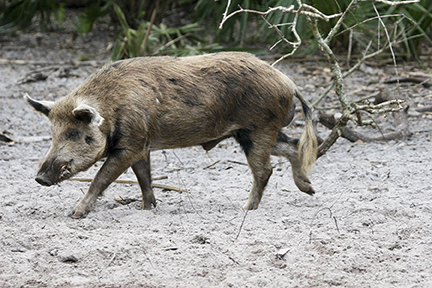Alabama Receives USDA Funding To Control Feral Swine

Marlee Moore
(334) 830-1053
Feral swine control projects in Alabama will receive $3.7 million to address the threat wild hogs pose to agriculture, ecosystems, and human and animal health, the U.S. Department of Agriculture (USDA) announced Nov. 21.
Nationally, USDA will award 10 states more than $16.7 million. Projects are part of the Feral Swine Eradication and Control Pilot Program (FSCP) — a joint effort between USDA’s Natural Resources Conservation Service (NRCS) and Animal and Plant Health Inspection Service (APHIS).
Alabama Farmers Federation President Jimmy Parnell applauded the announcement.
“We are very pleased to see additional resources being allocated to combat agricultural damage caused by feral swine,” said Parnell, who leads the state’s largest farm organization. “Increased federal funding for control efforts has been a priority for the Federation and this, in addition to increased funding through the annual appropriations process, will go a long way to support our farmers as they manage feral swine.”
Alabama pilot projects, which last three years, include select watersheds in Baldwin, Escambia, Geneva, Henry, Houston and Sumter counties.
Federation Wildlife Division Director William Green thanked USDA’s Fish and Wildlife Service for helping secure funding for Alabama, citing millions of dollars in damage caused by the hogs, which reproduce quickly. Studies show two mature hogs can reproduce to yield 30 hogs in as little as 8 months. Feral swine have been sighted in all 67 counties in Alabama.
“Feral hogs damage forests, cattle range, and fruit and vegetable operations, as well as row crop acreage,” Green said. “No aspect of agriculture is exempt from feral swine destruction.”
NRCS and APHIS are working with the Alabama Soil and Water Conservation Committee on three projects to notably reduce environmental and economic damage from wild pig rooting. They damage ecosystems and compete with native wildlife for habitat and food. Additionally, wild hogs degrade water quality and pose a serious disease threat to livestock and humans.
“Feral swine are the cause of significant damage to crops and grazing lands, while also impacting the health of our natural resources,” said NRCS State Conservationist Ben Malone. “By collaborating with our partners nationally and here in Alabama, our hope is to control this invasive species — improving operations for farmers while also protecting our natural resources for the future.”
Other pilot project states include Arkansas, Florida, Georgia, Louisiana, Mississippi, North Carolina, Oklahoma, South Carolina and Texas.
The 2018 Farm Bill provides $75 million for the FSCP over the life of the farm bill.
Learn more by clicking here.
